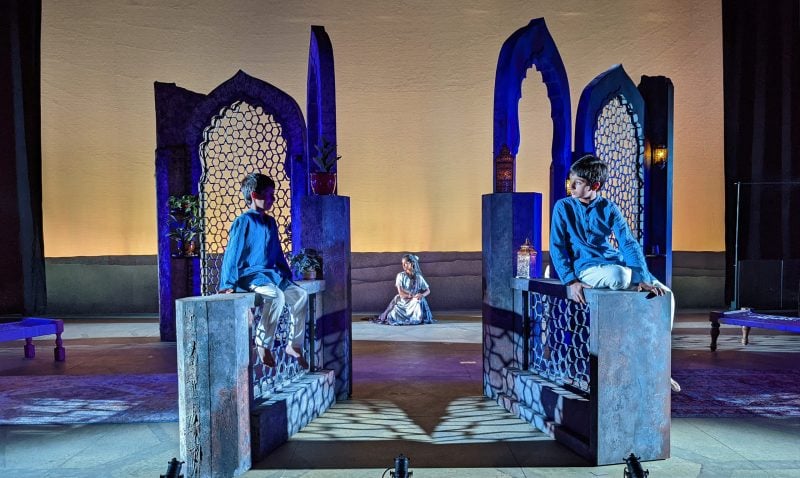Upon walking into Roble Gym on Wednesday for the TAPS production of “Pali,” directed by Suhaira Meera Ph.D. ’22, I first noticed the countless golden candles filling the courtyard with light. Haunting, plaintive music drifted through the corridors, and TV screens displayed interviews with those who had lived through the 1947 Partition. As I followed the white footprints painted on the floor, a sign nearby indicated that each step marked 51,370 people affected by Partition. “You just took 292 steps,” it noted gravely.
This pre-show experience, entitled “A Walk to Remember,” was a powerful way of preparing audiences for “Pali.” Adapted by Meera and Dustin Nakao-Haider from the short story of the same name by Bhisham Sahni, “Pali” explores the tragedies of Partition through the experiences of Pali (Waris Dahliwal and Nishan Dhaliwal), a young boy who is separated at the India-Pakistan border from his Hindu family during migration.
After being separated from his family, Pali is taken in by Shakur (Fayez Navid Anwar ’25) and Zenab (Saloni Sanwalka ’22), a kind Muslim couple residing in Pakistan. As Pali grows older, he becomes accustomed to a Muslim life: dressing in a red Rumi cap, performing the namaz and, most significantly, fully adopting his new name “Altaf,” given to him by his new mother, Zenab.
The religious and national conflicts of Partition come to the fore of Pali’s story. When Pali’s Hindu father, Manohar Lal (Usman Enam, first year Ph.D. student in genetics), finally finds Pali and brings him back to the Hindu-majority India, Pali’s religiously ambiguous identity becomes irreconcilable with the stark divisions between both nations. When Pali steps out of a party to perform his daily namaz, the Chaudhri of the mohalla (Avidesh Marajh ’23) tears Pali away from his prayer rug and rips off his red Rumi cap, berating him for corrupting the household with Muslim practices.
Ultimately, Pali exists in an uncomfortable liminal state. Though he is born in the Hindu-majority India and subsequently returns to his birth nation, he cannot easily turn his back on his Muslim upbringing in Pakistan. The other figures in Pali’s life also cannot easily reconcile with his new split identity; Zenab, for instance, remains haunted by her memories of young Pali, and dreams of playing hide-and-seek with Pali long after he has already left.
In the final scene of the play, the two Palis — younger (Waris Dhaliwal) and older (Nishan Dhaliwal) — gaze at each other from across the stage, which is bifurcated into a Pakistani side and an Indian side. The religious and national conflicts of Partition loom over the conclusion; in the end, no one escapes unscathed from these divisions.
But even as the play discusses the tragedies of Partition, it remains full of tenderness. In particular, the immense love that both pairs of parents feel for Pali is absolutely touching and heartwarming. Sanwalka gives a stellar performance as Zenab, portraying both her warmth towards Pali and her heartbreaking recognition that she will have to return Pali to his birth family. In one memorable scene, Zenab teases Pali and asks him to bring home a pretty girl; in another, she collapses to the floor in tears as she realizes that to keep Pali any longer would be to deprive another mother of her own son and joy.
Enam, too, delivers a powerful performance as Manohar Lal, Pali’s birth father. Through Enam’s acting, the desperation, distress and determination that fuel Manohar Lal’s every action come to life. As Manohar Lal negotiates with the social worker (Rashi Punia LLM ’22) to track Pali’s whereabouts and pleads with his wife Kaushalya (Mina Mahmood ’21) to believe that Pali is still alive, a sense of urgency and panic pulse in his every word. Yet all the while, there is something immensely powerful about his portrayal; it is moving to see a character so willing to fight for his lost son.
“Pali” is a powerful reflection on the pain of Partition. By exploring the unique story of Pali — caught between Muslim-majority Pakistan and Hindu-majority India — it gives voice to the tragedies of national, religious and geographic divisions.
Editor’s Note: This article is a review and includes subjective opinions, thoughts and critiques.
